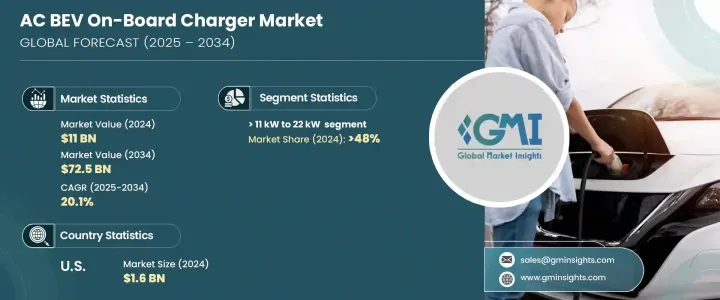
세계의 AC BEV 온보드 차저 시장 규모는 2024년에 110억 달러로 평가되었고, CAGR20.1%를 나타내 2034년에는 725억 달러에 이를 것으로 추정됩니다. 이 시장의 강력한 모멘텀은 야심찬 기후 목표, 높아지는 환경 인식, 탄소 배출을 억제하려는 정부의 의무 증가로 인해 전 세계적으로 전기화를 향한 대대적인 전환이 일어나고 있기 때문입니다. 배터리 전기 자동차(BEV) 채택이 급증하면서 효율적이고 컴팩트하며 비용 효율적인 온보드 충전기가 그 어느 때보다 중요해졌습니다. 또한, EV 에코시스템이 급속히 확대되고, 가정용, 상업용, 플릿 기반의 충전 요구가 포함됨으로써, 온보드 차저는 현재, 혁신의 최전선에 있어, 보다 접속된 지속 가능한 운송의 미래를 형성하는 일조가 되고 있습니다.

자동차의 배출가스 삭감을 목적으로 한 엄격한 국제규제가 전기차, 나아가서는 고도의 차재충전시스템 수요를 가속시키고 있습니다. 특히 충전 시간 단축, 효율 향상, 사용자 경험 개선 등 EV 충전에 있어서의 기술적인 비약적 진보는 전기자동차를 보다 친숙하고 매력적인 것으로 만들어 폭넓은 소비자층을 캡처하는 데 도움이 되고 있습니다.
| 시장 범위 | |
|---|---|
| 시작 연도 | 2024년 |
| 예측 연도 | 2025-2034년 |
| 시작 금액 | 110억 달러 |
| 예측 금액 | 725억 달러 |
| CAGR | 20.1% |
공공 충전소으로의 전환과 CCS 및 CHAdeMO와 같은 충전 표준의 통일을 위한 세계의 움직임은 충전 프로세스의 합리화에 중요한 역할을 하고 있습니다. 마트 충전 시스템은 또한 모바일 앱을 통한 원격 모니터링 및 제어를 가능하게 하고, 오프 피크 충전을 스케줄링하여 비용을 절감하고, 주거용 태양광 패널과 같은 재생 가능 에너지 소스를 통합하여 보다 환경 친화적이고 지속 가능한 EV 소유를 실현하는 등 사용자 경험을 변화시키고 있습니다.
AC BEV 온보드 차저 시장은 정격 전력을 기준으로 11kW, 11kW - 22kW, 22kW 이상으로 구분됩니다. 가격과 단순한 디자인으로 지원됩니다. 이 장치는 일반적으로 첨단 전자 장치 및 열 관리 시스템을 필요로하지 않으므로 고출력 동종 제품보다 제조 비용을 낮출 수 있습니다.
미국의 AC BEV 온보드 차저 시장은 2024년에 16억 달러로 평가되었습니다.
이 시장 주요 기업은 Alfanar Group, ST 마이크로 일렉트로닉스, Ficosa International SA, Delta Energy Systems, 도요타 자동 직기, Valeo, Xepics Italia SRL, BorgWarner Inc., BRUSA Elektronik AG, Powell Industries, Eaton Corporation, AVID Technology Limited, Delphi Technologies Company, Current Ways Inc., nonelectric AG, Stercom Power Solutions GmbH 등이 있습니다. 이러한 기업은 급속 충전과 재생 가능 에너지의 통합을 지원하는 고성능으로 비용 효율적인 솔루션을 도입하기 위해 연구 개발에 많은 투자를 실시했습니다.
The Global AC BEV On-Board Charger Market was valued at USD 11 billion in 2024 and is estimated to grow at a CAGR of 20.1% to reach USD 72.5 billion by 2034. The strong momentum in this market is fueled by a sweeping global shift toward electrification, driven by ambitious climate goals, rising environmental awareness, and growing government mandates to curb carbon emissions. As the automotive landscape undergoes a massive transformation, automakers and suppliers are under immense pressure to adapt to an electrified future. The surge in battery electric vehicle (BEV) adoption has made efficient, compact, and cost-effective on-board chargers more critical than ever. As consumers demand longer range, faster charging, and better performance, on-board chargers are evolving to meet these expectations with smarter, more capable technologies. Moreover, with the EV ecosystem rapidly expanding to include residential, commercial, and fleet-based charging needs, on-board chargers are now at the forefront of innovation, helping shape a more connected and sustainable transportation future.

Stringent international regulations aimed at reducing vehicle emissions are driving the accelerating demand for electric vehicles and, consequently, advanced on-board charging systems. With governments around the world pushing for large-scale EV deployment, the need for reliable, efficient, and user-friendly charging infrastructure is surging. Technological breakthroughs in EV charging-particularly in reducing charge times, enhancing efficiency, and improving user experience-are helping make electric vehicles more accessible and appealing to a broader consumer base.
| Market Scope | |
|---|---|
| Start Year | 2024 |
| Forecast Year | 2025-2034 |
| Start Value | $11 Billion |
| Forecast Value | $72.5 Billion |
| CAGR | 20.1% |
The transition toward public charging stations and the global push to unify charging standards, such as CCS and CHAdeMO, are playing a vital role in streamlining the charging process. By resolving compatibility issues and offering greater convenience, these developments are supporting the EV transition on a larger scale. Smart charging systems are also transforming user experiences, enabling remote monitoring and control via mobile apps, scheduling off-peak charging to reduce costs, and integrating renewable energy sources like residential solar panels for greener, more sustainable EV ownership.
Based on power rating, the AC BEV on-board charger market is segmented into 11 kW, 11 kW to 22 kW, and over 22 kW. The 11 kW to 22 kW segment accounted for a 48% market share in 2024, with the 11 kW chargers being particularly favored for their affordability and design simplicity. These units typically require less sophisticated electronics and thermal management systems, keeping production costs lower than their higher-powered counterparts.
The U.S. AC BEV On-Board Charger Market was valued at USD 1.6 billion in 2024. Federal and state-level incentives, including tax benefits for high-power charger installations, have significantly spurred EV sales. This growth has led manufacturers to prioritize innovations in faster and more efficient charging technologies to align with evolving consumer expectations.
Key players in the market include Alfanar Group, STMicroelectronics, Ficosa International SA, Delta Energy Systems, Toyota Industries Corporation, Valeo, Xepics Italia SRL, BorgWarner Inc., BRUSA Elektronik AG, Powell Industries, Eaton Corporation, AVID Technology Limited, Delphi Technologies, Bell Power Solution, Kirloskar Electric Company, Current Ways Inc., nonelectric AG, and Stercom Power Solutions GmbH. These companies are investing heavily in R&D to introduce high-performance, cost-effective solutions that support fast charging and renewable energy integration. Strategic collaborations with automakers and energy providers are helping these players strengthen their market presence and keep pace with the rising demand.